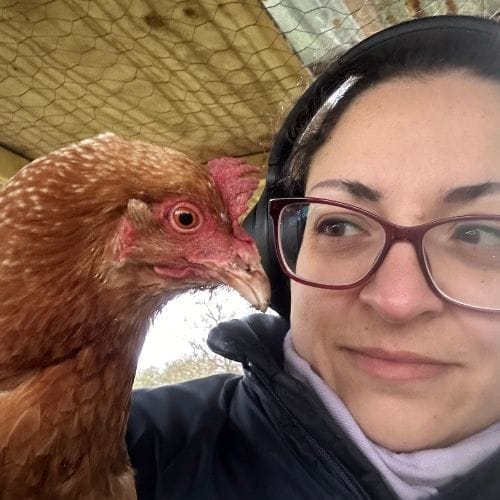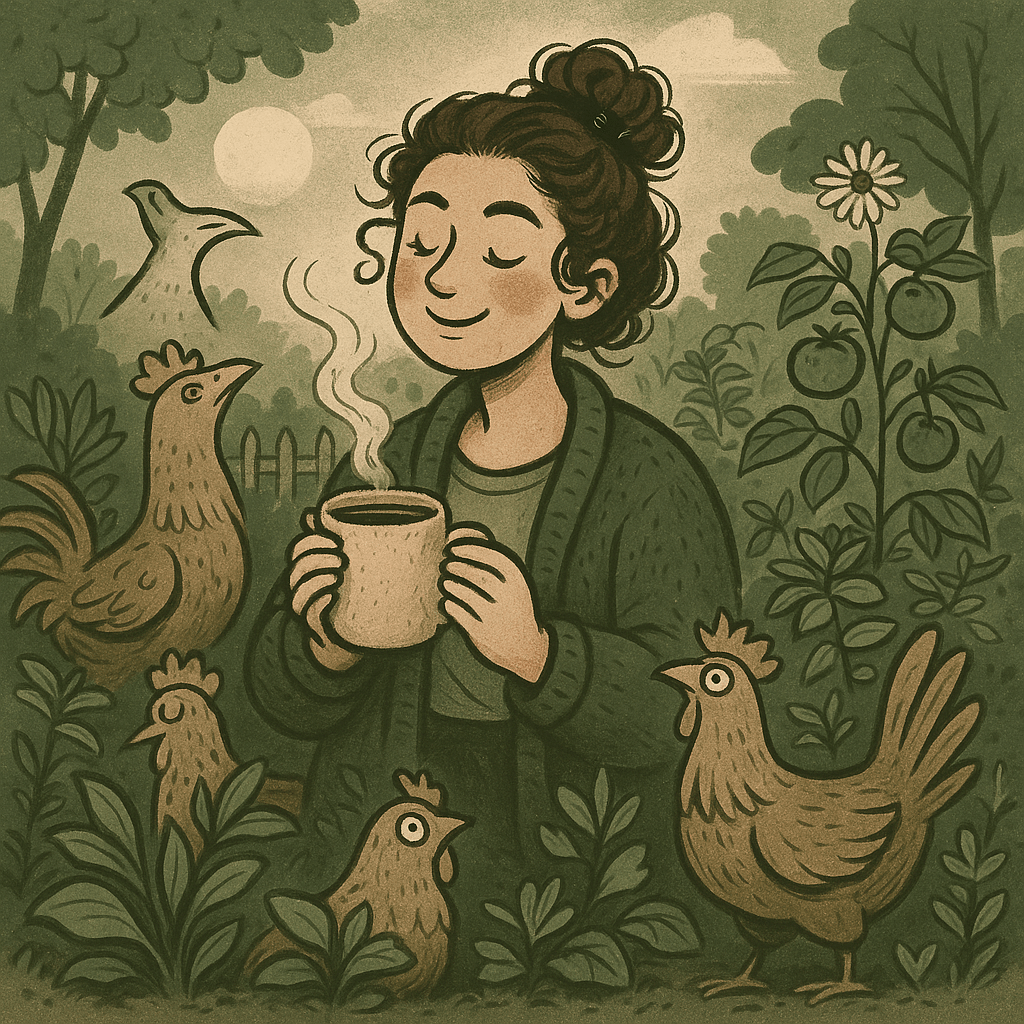
Affiliate Disclosure
Some links on this website are affiliate links.
That means if you click and buy something, I may earn a small commission — at no extra cost to you.
I only recommend things I actually use, love, or would happily hand to a friend while saying, “Trust me.”
Affiliate income helps keep this blog running, the chickens fed, and the espresso flowing ☕🐓
You are never obligated to buy anything through these links — but if you do, grazie mille for supporting this chaotic corner of the internet.
This site uses affiliate links and I may earn a small commission when you use my links and make a purchase without incurring additional fee yourself. Many thanks for supporting this website.
Please click here for more details.
Why Are My Chickens Breathing with Their Mouth Open? Should You Be Worried?
If you keep backyard chickens, you've probably memorized their daily habits—clucking, scratching, pecking, and strutting around like tiny feathered royalty. So when one of your birds suddenly starts breathing with its beak wide open like it's mid-opera, your internal alarm bells ring. Is it heat? Is it illness? Is it something more serious?
Open-mouth breathing in chickens is one of those behaviors that seems small but can signal a whole range of issues, from the totally manageable to the “call the vet yesterday” kind of concerns. In this detailed guide, we’ll walk through the possible reasons your chickens are panting like little dinosaurs and what steps you can take to keep your flock clucking happily along.
Why Are My Chickens Breathing with Their Mouth Open? Should You Be Worried?
What Does Open-Mouth Breathing Actually Mean in Chickens?
Let’s start with what we’re seeing. A chicken breathing with its mouth open isn’t just being dramatic—it’s trying to tell you something. This behavior, often accompanied by symptoms like wheezing, nasal discharge, or listlessness, usually indicates that your bird is experiencing some kind of respiratory challenge or heat-related stress.
Unlike mammals, chickens don’t sweat. Instead, they rely on panting to cool down. But when that open-mouth breathing is persistent or paired with other symptoms, it might be a red flag for something more serious than summer heat.
So how do you tell the difference between a hot hen and a sick one? Context is everything.
Top Reasons Your Chickens Might Be Breathing with Their Mouth Open
1. Heat Stress and Environmental Overload
Chickens are surprisingly vulnerable to high temperatures, especially during those sweltering midsummer days. If your birds are panting, spreading their wings, or lying around like limp noodles, it’s probably heat stress.
When temperatures rise, chickens will breathe with their mouths open to try and stay cool. But this response can escalate quickly into heat exhaustion if they don’t have enough shade, airflow, or hydration.
To prevent this:
Offer multiple shaded areas in the run.
Ensure constant access to cool, clean water.
Add electrolytes during heatwaves to replace lost minerals.
Improve ventilation in the coop—stale air is your enemy in hot weather.
2. Respiratory Infections and Airway Obstructions
If it’s not hot and your chicken is still gaping for air, consider respiratory infections. Chickens can suffer from diseases like infectious bronchitis, mycoplasma gallisepticum, or even avian influenza. These illnesses attack the respiratory tract and cause labored breathing, sneezing, nasal discharge, and a general “under the weather” vibe.
Some signs that your bird might be battling more than just heat:
Rattly or wet-sounding breathing
Coughing or sneezing
Closed eyes or puffed-up feathers
Lethargy or reduced appetite
Infections like these spread fast through flocks, so early intervention is crucial. Isolate the sick bird, call a poultry-savvy vet, and clean the coop like your flock’s lives depend on it—because they might.
How to Spot the Difference: Heat Stress vs Respiratory Illness
Knowing what you're dealing with can mean the difference between a simple fix and losing half your flock. Here’s what to watch for:
Heat Stress Symptoms
Open-mouth breathing, especially during the hottest parts of the day
Panting while wings are held away from the body
Pale or droopy combs and wattles
Reduced activity or laying down in shaded spots
Respiratory Illness Symptoms
Mouth breathing at all times, not just during heat
Gurgling or wheezing noises
Discharge from eyes or beak
Fluffed feathers, hunched posture
Decrease in egg production or feed intake
If in doubt, treat for heat and keep an eye out for signs of infection. Prevention is better than heartbreak.
Other Causes to Consider
Not everything is dramatic—sometimes open-mouth breathing can be caused by:
Stress: After a predator scare or introduction of new birds
Poor air quality: Ammonia buildup from droppings can irritate the lungs
Obstructions: Grass, food, or debris caught in the throat
Parasites: Gapeworm is a sneaky culprit, especially in free-ranging birds
Check their living conditions, observe their behavior, and inspect the throat gently (or let a vet do it).
Preventive Care: Keeping Your Flock Healthy and Cool
Environmental Upgrades
Provide cross-ventilation in your coop—don’t underestimate the power of a breeze.
Avoid overcrowding: more chickens = more heat and less air.
Use sand or pine shavings for better bedding management and less ammonia build-up.
Clean water is non-negotiable. Check it daily, especially in the summer.
Health Maintenance
Vaccinate when appropriate and consult your vet for region-specific disease risks.
Practice good biosecurity—limit contact between flocks, wild birds, and human shoes!
Quarantine new birds for at least 2 weeks before introducing them to the flock.
When to Call the Vet
You know your chickens best. If one (or more) starts showing:
Persistent open-mouth breathing with no heat present
Strange vocalizations or silence when they’re normally chatty
Changes in droppings or egg production
Rapid weight loss or weakness
…it’s time to get a professional involved. Poultry vets can diagnose respiratory infections, parasites, or other internal issues that you can’t see.
Early treatment can save not just the sick bird, but the rest of your flock from contagion.
Preventing Disease Spread in the Coop
Once illness strikes, limiting its spread is key:
Isolate the affected chicken in a quiet, well-ventilated spot.
Use gloves and sanitize your hands between handling birds.
Clean feeders, waterers, and perches daily with disinfectant.
Replace bedding and keep the coop dry.
Prevention is a lifestyle for chicken keepers. Think of it as flock-level wellness.
Final Thoughts: Don’t Panic, But Do Act
Chickens breathing with their mouths open isn’t always an emergency—but it always means something. Whether it’s just a hot day or the start of a nasty infection, catching it early gives your flock the best chance to bounce back.
Remember:
Rule out heat first
Check for other symptoms
Act quickly if it looks like illness
Keep that coop cool, clean, and breezy
With a watchful eye and a few smart upgrades, you can keep your feathered friends healthy, happy, and squawk-free—beaks closed and all.

Zia Paola
Zia Paola is a burnout survivor, chicken enthusiast, and former veterinary surgeon turned digital mischief-maker. She writes from her semi-chaotic smallholding in the UK, where she splits her time between unhinged chickens, rustic recipes, and helping others reclaim their lives from hustle culture. You can find her ranting lovingly about slow living, food, and freelance freedom at www.badinfluenzia.com.

Get mildly chaotic life advice, anti-burnout rants, and unsolicited chicken wisdom delivered straight to your inbox. No fluff. Just feathers.
Created with ©systeme.io



